高中英语 Unit 4 Earthquakes Period One Warming Up Reading同步测试2 新人教版必修1
高中英语人教版必修一Unit4知识点汇总及强化练习
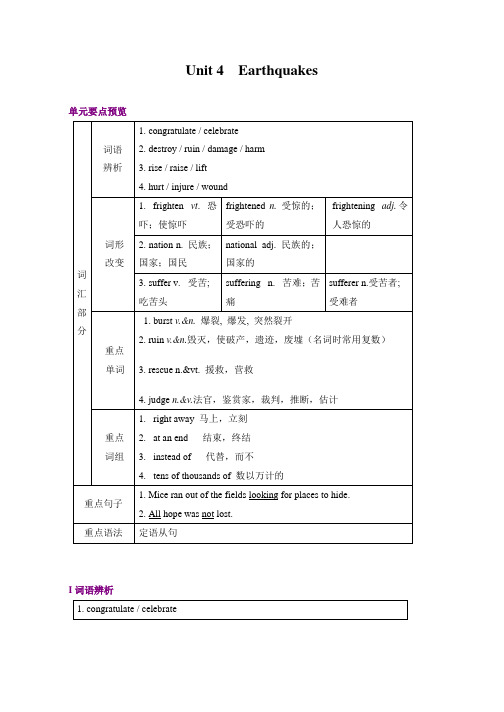
Unit 4 Earthquakes 单元要点预览I词语辨析II词性改变Ⅲ重点词汇1. burst v.&n. 爆裂, 爆发, 突然裂开[典例]1).The red balloon suddenly burst. 那个红色的气球突然爆了。
2). The police burst through the door.警察破门而入。
3). On hearing the news, Leslie burst into laughter while Tracy burst out crying.一听到这则消息,Leslie突然大笑,而Tracy则突然大哭起来。
4). A burst of hand-clapping followed the ending of the song.歌声结束后响起了一阵掌声。
[重点用法]burst into laughter = burst out laughing 突然大笑burst into tears = burst out crying 突然大哭[练习] 中译英1). 水管在寒冷的天气里常常冻裂。
______________________________________________________________________2). 太阳突然从云端里露出来。
______________________________________________________________________2. rescue n.&vt. 援救,营救[典例]1). The police came to his rescue and pulled him out of the river.警察来救他,把他从河里拉了出来。
2). The rescue team made countless rescues during the earthquake.营救队在这次地震期间进行了多数次救援。
人教版高中英语必修第一册 《Unit 4:Earthquakes》教案

人教版高中英语必修第一册 《Unit 4:Earthquakes》教案一、教学目标1.知识目标o学生能够掌握与地震相关的重点词汇和短语,如 “earthquake, ruin, destroy, rescue, shock” 等。
o学生能够理解并运用描述地震现象、危害和救援的句型和表达方式。
2.技能目标o学生能够听懂有关地震的简单对话和新闻报道,获取关键信息。
o学生能够阅读并理解关于地震的文章,分析文章结构和主旨。
o学生能够用英语简单讲述地震的相关知识和个人应对地震的措施。
o学生能够写一篇关于地震预防或救援的短文,表达自己的观点和建议。
3.情感目标o培养学生对自然灾害的认识和防范意识。
o激发学生的同情心和社会责任感,关注地震受灾地区和人群。
二、教学重难点1.教学重点o重点词汇和短语的记忆与运用。
o对课文中地震相关内容的理解和语言表达的学习。
o培养学生用英语描述地震和表达应对措施的能力。
2.教学难点o如何帮助学生理解地震的复杂科学原理和巨大危害,并能用英语进行准确描述。
o引导学生在写作中清晰、有条理地阐述地震预防或救援的观点和建议。
三、教学方法1.直观演示法:通过图片、视频等展示地震的场景和数据。
2.问题引导法:以问题为导向,引导学生思考和探究。
3.讨论交流法:组织学生讨论地震相关话题,促进学生之间的思想交流。
四、教学过程(一)导入(5 分钟)1.播放一段地震的视频片段,展示地震的破坏力。
2.提问学生:What do you see in the video? How do you feel about earthquakes?(二)词汇学习(10 分钟)1.呈现本单元的重点词汇和短语,结合地震的情景进行讲解。
2.通过词汇练习,如填空、选择等,巩固学生对词汇的理解和掌握。
(三)阅读前准备(5 分钟)1.让学生观察课文标题和图片,预测文章的主要内容。
2.提出一些引导性问题,如:What might the article talk about earthquakes?(四)课文阅读(15 分钟)1.学生快速阅读课文,概括文章的主旨。
教学设计_人教版_高中英语1_必修_ Unit 4 Earthquakes_ Period 1 Warming up and Reading
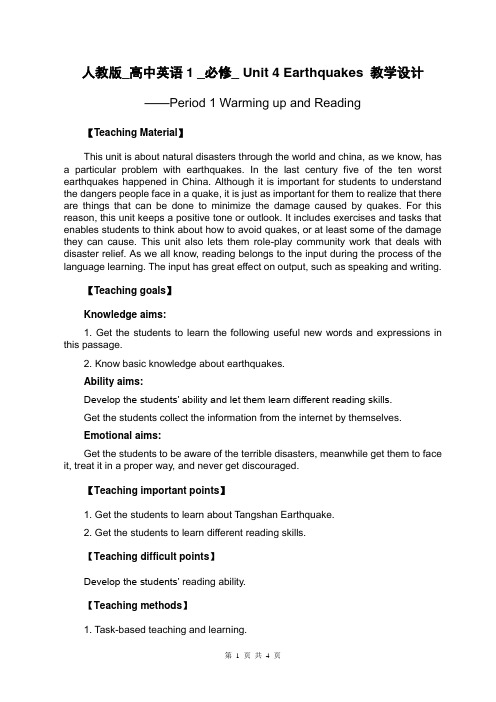
人教版_高中英语1 _必修_ Unit 4 Earthquakes 教学设计——Period 1 Warming up and Reading【Teaching Material】This unit is about natural disasters through the world and china, as we know, has a particular problem with earthquakes. In the last century five of the ten worst earthquakes happened in China. Although it is important for students to understand the dangers people face in a quake, it is just as important for them to realize that there are things that can be done to minimize the damage caused by quakes. For this reason, this unit keeps a positive tone or outlook. It includes exercises and tasks that enables students to think about how to avoid quakes, or at least some of the damage they can cause. This unit also lets them role-play community work that deals with disaster relief. As we all know, reading belongs to the input during the process of the language learning. The input has great effect on output, such as speaking and writing.【Teaching goals】Knowledge aims:1. Get the students to learn the following useful new words and expressions in this passage.2. Know basic knowledge about earthquakes.Ability aims:Develop the students’ ability and let them learn different reading skills.Get the students collect the information from the internet by themselves.Emotional aims:Get the students to be aware of the terrible disasters, meanwhile get them to face it, treat it in a proper way, and never get discouraged.【Teaching important points】1. Get the students to learn about Tangshan Earthquake.2. Get the students to learn different reading skills.【Teaching difficult points】Develop the students’ reading ability.【Teaching methods】1. Task-based teaching and learning.2. Fast reading, intensive reading3. Discussion.【Teaching aids:】CAI课件, A tape recorder【Teaching procedures】Step 1 Warming upWarming up by lookingShow Ss some pictures about natural disasters and ask them two questions.1. Can you tell some natural disasters?(volcano, fire, sandstorm, typhoon, hailstone, thunderstorm, flood, hurricane, earthquake)2. Have you ever experienced an earthquake? Can you describe how terrible an earthquake is?(The earth is shaking; all the buildings will fall down; many people will die; many children will become orphans.)Warming up by discussingNow, look at the pictures of Tangshan and San Francisco in warming up and describe what you see in the pictures.(Beautiful cities; broad roads; tall building; large population...)What will happen if there has been a big earthquake in these two cities?As we all know, earthquakes are disasters to everyone. But can we avoid or at least reduce the loss caused by earthquakes? Can we foretell earthquakes? Now let’s come to Pre-reading and decide what may happen before an earthquake comes.Step 2 Pre-readingImaging and sharingImagine there is an earthquake now. Your home begins to shake and you must leave it right away. You have time to take only one thing. What will you take? Is it money, water, fruits, mobile, phones, a torch light, or anything else? Why?Talking and sharingWhat are the signs of an earthquake? Talk about the pictures on Page 25.(e.g. Cows, pigs and dogs become too nervous too eat. The mice will run out of the fields looking for places to hide. The water in the wells will rise and fall. Walls of the wells in village will have deep cracks. There will be bright light in the sky….) Step 3 ReadingTell the students: Today, we are going to read a news report about the strongest earth-quake in China’s history, which happened in Tangshan, Hebei, in 1976.1. Fast readingAsk the students to read the passage quickly.1) Answer some questions.Ask the students to read the passage quickly and pay attention to the first sentence of each paragraph.2) Find out the topic sentences of each paragraph and get the general idea of the passage.3) Do some true or false exercises.Ask the students to decide whether the following statements are true or false. If it is false, try to correct it.2. Reading carefullyAsk the students to read the passage carefully to lacate particular information.1) Do the exercises in the part Comprehending on Page 27.2) Do some multiple choices.3. Language problemsWhile checking the answers with the whole class,deal with any language problems that the students can’t understand.4. Reading aloudPlay the tape of the passage for the students to listen and follow. Then play the tape of Paragraph 1 of the passage once more; this time the students listen and repeat.Step 4 GameWork in pairs. Supose you are a newspaper reporter, and other is a witness of the 1976 Tangshan Earthquake. Now the newspaper reporter is interviewing the witness.Step 5 DiscussionHow can we protect ourselves in the earthquake?Earthquake Survival TipsDriving --- pull over and stay in your car.In a building--- get near a strong wall / The corner of the room is the safest.Having classes--- listen to the teacher’s instruction, protect their heads and hide under the desks.On buses--- Grasp the handles to avoid being injured; lower the center of gravity; hide near the seats; get off after the earthquake passed.Step 6 HomeworkP review the reading “A Night the Earth didn’t Sleep” and learn new words of this unit.。
高中英语 Unit 4 Earthquakes-Period 1课件
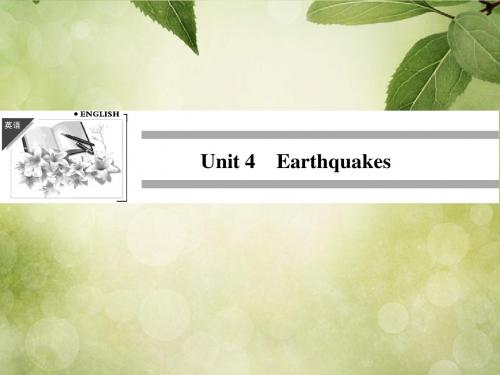
2.Mice ran out of the fields looking for places to hide. [信息提取] looking for places to hide 为现在分词短语作状 语,此处表伴随。 [例句仿写] 他们在那儿站了半个小时,观察着天上的星星。 They stood there for half an hour ________ ________ ________ ________ ________ ________. 3.It seemed as if the world was at an end! [信息提取] It seemed as if...句型。 [例句仿写] 看来我们队好像要赢了。 ________ ________ ________________our team is going to win.
B.the survivors were made to lose their senses by the sudden big
earthquake C.the survivors didn't realize in such a brief instant that it was a terrible earthquake D.the survivors didn't think an earthquake could bring such great
earthquakes,
the vibration may be no greater than the vibration caused by a
passing truck. On average, a powerful earthquake occurs less than once every two years. At least 40 moderate earthquakes cause damage somewhere in the world each year. About 40,000 to 50,000 small earthquakes—
Unit4_Earthquakes_The_First_Period_Reading_新课标_人教版_必修1

typhoon
fire
snow slide
mudflow
volcano eruption
tornado
火山爆发
sandstorm
flood
earthquake
Warming up
Tangshan
Look at the following pictures, try to describe (描述) what you have seen in the pictures. roads people
What will you take? Why?
water
money
identity card
pictures of family
map
books
food
clothes
radio
mobile phone
computer
1.Preview the text on page26 .
2.Try to find some questions ( words,phrases,or sentences ) in the text,if any. 3. What can we do to reduce the damage of earthquakes?
What do you think may happen before an earthquake?
bright People could see _______lights in the sky.
What do you think may happen before an earthquake?
Guess:
what may happen before an earthquake?
高中英语人教版必修一Unit4《Earthquakes》教案

Unit 4 Earthquakes1.Knowledge:Learn and master the new words and expressions in this period.Words:Ability:1.Train the students’ listening ability.2.train the students’ listening ability.3.Train the students’ ability to use the Internet to search for some usefulinformation.4.Train the students’ ability to cooperate with others.Emotion:1.Know the damage that an earthquake2.Know the ways to reduce the losses of an earthquake.Teaching important pointsTrain the students’ speaking ability by describing, talking and discussion. Difficulties:Train the students’ listening ability.Step1 Warming-upT:Do you know what happened in the Indian Ocean at the end of last year? It shocked or we can say frightened the whole world.S: A terrible tsunami broke out there on 26th December. More than 200 000 people were killed.T: Yes. It is said that it is the biggest in the fore decades. A tsunami is an undersea earthquake. Then have you heard of any land earthquakes? Would you please list some? 学.科.S: We can often hear that earthquakes occur in Japan. In 1906, an earthquake struck San Francisco, USA. About 700 people died in the earthquake and the fires. And as many as 250 000 people lost homes.T: But do you know any famous earthquakes that happened in our county?S: The Tangshan Earthquake that happened in 1976.T: Can you tell me what mighty happen in an earthquake? You may look at the two pictures on Page 25.Step 2 ListeningT: Before we learn the passage about an earthquake, let’s first know why there are earthquakes in the world. So let’s do some listening on Page 62. listen to the tape for the first time and try to get a general idea of the passage.Listen to the tape and check the answers.( It is about the cause of earthquakes and how we can reduce losses from them.)T: Listen to the tape for the second time and judge whether the statements in Part 1 are true of false.T: Let’s check the answers. Listen again and try to correct the statements that are false.T: Listen again and try to complete the table in Part 2.A few minutes later, check the answers. 学,科,网Z,X,X,K]Step 3 Homework1.Preview the reading passage on Page 26 and do exercise I in the part “Learningabout language”.2.Ask the to look for more ways of reducing losses from earthquakes. The studentscan go to the library or use the Internet to search for information. After searching for the information, each group should make a poster, informing people how to reduce the losses of an earthquake. 学_科_网Z_X_X_K]Record after teaching :_____________________________________________________________________ _____________________________________________________________________ _____________________________________________________________________ _____________________________________________________________________ _____________________________________________________________________ _____________________________________________________________________ _____________________________________________________________________ _____________________________________________________________________ _____________________________________________________________________The Second PeriodKnowledge:Learn some new, phrases and some new sentence patterns.Ability:1.learn some detailed information about an earthquake.2.improve the students’ reading ability.3.train the students’ ability to grasp key information while listening.4.train the students’ speaking ability.Emotion:1.Train the students’ ability to cooperate with others.2.Know the deadliness of an earthquake and the signs before an earthquake iscoming.3.Learn from the bravery of people in Tangshan to face the reality and rebuild thecity.Teaching important points:1 The new words and expressions.2. Learn some detailed information about an earthquake.3. Train the students’ ability to cooperate with others.4. Train the students’ speaking ability.Teaching difficulties:1 Words: shake, burst, rise, destroy, shock, fresh, injure2. Phrases: right away, at an end3. Sentence patterns:(1) It seemed/ seems that…(2) The number of sb./sth. Reached/reaches…(3)All hope was not lost.4. Improve the students’ reading ability.5. Train the students’ ability to grasp key information while listeningTeaching procedures:Step 1 Pre-readingT: Suppose you are warned of a coming earthquake. Now you have time to take only one thing. Tell your partner what you will take and the reason.T: If an earthquake is around the corner, there must be some abnormal phenomena. Carefully look at the four pictures on Page 25 and try to describe what you have seen. Step2 ListeningT: Everyone knows that an earthquake is very terrible. Today, we will learn something about the strongest earthquake in China’s history, which happened in Tangshan, Hebei, in 1976. First listen to the tape with your textbooks closed and check whether the following statements are true or false. If it is false, try to correct it.1.People in Tangshan were warned of the earthquake and didn’t go to bed that night.(F)2.People in Beijing also felt the earthquake. (T)3.More than 400 000 people were killed in the quake. (F)4.Many rescue workers and doctors were trapped under the ruins during theaftershock. (T)5.People tried to get fresh water from under the ground in Tangshan. (F)Step 3 Reading1.Finish Part 1-2 in Comprehending on Page 27.2.Finish Part 3 in Comprehending on Page 27.3.Read the passage again to get important information about Tangshan Earthquakeand fill in the blanks. ( 百思英语Page 44 )Step 4 Speaking or Reading aloudIf your students are good at English, ask them to do this exercise:Suppose one of you was a newspaper reporter, and the other was a witness of the 1976 Tangshan Earthquake. Now the newspaper reporter is asking the witness some questions. Work in pairs please.If your students are very poor in English, ask them to do this exercise:Play the tape for the students to listen and follow in order to let them know how to read the text.Step 5 Homework1.Read the text several times.2.Do exercise 3 on Page 28.3.Do exercise 2 on Page 28 in the exercise book and hang it in tomorrow.4.Learn some words and phrases in this unit and make some sentences with them.( Ss’ Book, Page 82-84)Record after teaching :_____________________________________________________________________ __________________________________________________________________________________________________________________________________________ ____________________________________________________________________ _____________________________________________________________________ _____________________________________________________________________ _____________________________________________________________________ _____________________________________________________________________ _____________________________________________________________________ _ZxxkThe Third PeriodKnowledge:1.words: crack, burst, ruin, injure, destroy, shock, last2.phrases: at an end, right away, dig out3.sentence patterns:All hope was not lost.Ability:1.Train the students’ ability to read different numbers in English.2.Learn the usage of some difficult words and expressions.3.Train the students’ ability to remove the difficulties while reading.Emotion:1.Train the students’ ability to cooperate with others.2.Know the deadliness of an earthquake and the signs before an earthquake iscoming.3.Learn from the bravery of people in Tangshan to face the reality and rebuild thecity.Teaching important points:1.Train the students’ ability to read different numbers in English.2.Train the students’ ability to cooperate with others.Teaching difficulties:1.The explanation of some difficult words and expressions.2.Train the students’ ability to remove the difficulties while reading.Teaching procedures:Step 1 Revision1.T: In the last period , we learned something about the terrible Tangshan Earthquake in 1976, which is the deadliest earthquake in China’s history. Now I am going to ask you some questions based on the Reading passage.(1)What did people in Tangshan see in the sky before the earthquake? 学|科|(2)What did people notice in the wells?(3)Did people pay any attention to these abnormal phenomena?(4)When did the earthquake begin?(5)Were there any aftershocks?(6)Did the survivors deny the city and go to live in other places?2. Check the homework (Ex2 on P28). Ask them to recite it after class.Step 2 Learning about NumbersTurn to Page 28 and look at Part 3. Match each word to the number that has the same meaning. Allow the students several minutes to finish the task. Check the answers. Step 3 Important pointsAsk the students to turn to Page 82. Ask some students to make some sentences with the words or phrases. Deal with some difficulties. You can add more phrases.Step 4 homeworkIn order to master the usage of these words and expressions, please do some related exercises.1.Finish off the two parts in Using Words and Expressions on Page 63.2.Translate the sentences on Page 63 into English. Write the English sentences inone of your exercise book and hand it in tomorrow.Record after teaching :_____________________________________________________________________ _____________________________________________________________________ _____________________________________________________________________ _____________________________________________________________________ _____________________________________________________________________ _____________________________________________________________________ _____________________________________________________________________ _____________________________________________________________________ _____________________________________________________________________The Fourth PeriodKnowledge: ZXXK]1.Learn the Attributive Clause.2.Learn the difference between Relative Pronouns for the Attributive Clauses. Ability:1.Learn to choose the correct Relative Pronouns for the Attributive Clauses.2.Train the students’ ability to report what others have said.Emotion;Train the students’ ability to cooperate with each other.Teaching important points:1.Learn the Attributive Clause.2.Train the students’ ability to report what others have said.Teaching difficulties:Learn to choose the correct Relative Pronouns for the Attributive Clauses.Teaching procedures:Step 1 revisionCheck the homework exercises.Step 2 Grammar( The teacher writes the sentence “ Workers built shelters for survivors whose homeshad been destroyed.” On the blackboard before class begins.)T: Please look at the sentence on the blackboard, paying special attention to the underlined part. What kind of clause is it?Ss: The Attributive Clause.T: Yes. The Attributive Clause tells us which person or thing (or what kind of person or thing ) the speaker means.e.g. The woman who lives next door is a teacher.A sen tence with an attributive clause contains two shorter sentences. In the sentence above, the two short sentences are: “The woman is a teacher.”And “The woman lives next door.” The Attributive Clause is the answer to the question: Which woman is a teacher?Would you try to divide the sample sentence on the blackboard into two short sentences?T: That’s right. Now try to find all the sentences with Attributive Clauses in the reading passage and divide each sentence into two short sentences.T: Next I will say s omething about the common relative pronouns.“Who”is used for people. “Which”is used for things. “That” is used for things or people. “Whose” is used instead of his/her/their/somebody’s. “Whom” is quite formal, and in most cases it is all right to use who instead. But when whom has a preposition before it, it cannot be replaced by who.Ste p 3 Practice1. Now look at Part 2 in Discovering Useful Structures on Page 28. try to complete each sentence using that, which, who, or whose.Let the students do this exercise and check the answers.2.Do more exercises in Ex 3 on Page51 in《导学》Step 4 HomeworkAfter class, read the passage on Page 64. It’s about advice on how to protect your home from an earthquake. Complete the sentences below, using who, whom, which, that or whose.Record after teaching;_____________________________________________________________________ _____________________________________________________________________ _____________________________________________________________________ _____________________________________________________________________ _____________________________________________________________________ _____________________________________________________________________ _____________________________________________________________________ _____________________________________________________________________ _____________________________________________________________________ .The Fifth PeriodKnowledge:1.Know how to write a speech.2.Know how to write a newspaper story.Ability:1.Train the students’ speaking ability.2.Train the students’ ability to search for doing something.3.Train the students’ ability to do things step by step.Emotion:1.Honor the great people of Tangshan.2.Learn to cooperate to each other.Teaching Important Points:1.Train the students’ speaking ability.2.Train the students’ ability to search for doing something.Teaching Difficulties:1.Know how to write a speech.2.Know how to write a newspaper story.3.Learn to cooperate to each other.Teaching Procedures:Step 1 RevisionT: In the last period, we learned the Attributive Clause and how to choose a proper relative pronoun. Now let’s check your homework exercises. Please open your textbooks and turn to Page 64. Look at Part 1 in Using Structures. I will ask some of you to read the sentences out.(The teacher corrects mistakes if there are any.)Step 2 Readi ng and WritingT: Read the letter on Page 29.In the blank at the beginning of the letter, write the last number of the year it is now. Then in the blank near the end of the letter, use a number to say how many years ago the quake happened.(After several minutes, the teacher checks the answers with the class.)T: Suppose you are the student who was invited to give the speech. What should you include in your speech?(Students give their different answers.)T: Y es, while writing, don’t forget to contain the information. Now I will give you 15 minutes to write the speech. You can follow the points in part 3 on this page. (While the students are writing, the teacher gets around the classroom and helps the students to deal with any difficulties that they have.)(After 15 minutes)T: Are there any volunteers to read his or her speech?( If there is nobody, the teacher asks one to read, and give some assessments.)Step 3 SpeakingT: Imagine that after your speech, Zhangsha asks you to give a short talk about the new stamps about Tangshan to honor the city. First, ask and answer the following questions in pairs.(1)What do these stamps show?(2)Do you think these stamps are very important and why?(3)Will you collect these stamps? Why and why not?(After the students ask and answer these questions in pairs.) 学科T: Now try to fill in the lines in the little talk. You can use some of the answers to the questions.T: Next I will ask one of you to read the little talk.Step 4 WritingT: By now you have learned writing a speech and a little talk. Now you are going to write an article for a newspaper about a special event that happed in your hometown. First, let’s learn some skills of writing news paper stories. Before you write, you should write an outline. This is very useful. Today, we will learn how to write an outline. Please turn to Page 31. Read the instructions in bold and pay attention to some questions I prepared to you.Q1: Why is an outline important?Q2: What should an outline include?Q3: Why is a headline important?Q4: What are the steps to finish a newspaper story?Q5: What is the feature of a newspaper story?Suggested answers:1.Because an outline will prepare you to write a better story.2. A good outline should have a headline, a list of main ideas and a list of importantdetails.3. A headline can tell the readers what the topic is, so it can attract the readers’attention since the reader may not have bought the newspaper before they read the headline.4.First, organize the main ideas. Next, put some details into each paragraph.5. A newspaper stor y gives the most important news first and the least importantnews last.T: Now let’s read the example of a newspaper story. Try to find the headline, main idea and details of each paragraph. You may work in groups of three.(After several minutes, the teacher asks the students the following questions :)Q1: What is the headline of the newspaper story?Q2: What is the main idea?Q3: What is the detailed information?T: Now turn to Page 32 and check your main ideals and detailed information.Step 5 HomeworkT: So now you know how to write a passage step by step. Prepare the outline for a short newspaper story for China Daily. Use the example to help you to organize your outline. You can first have a discussi on with your partner and decide which event you will write about. Try to write down the title, main ideas and detailed information. Then put them into a short passage.ZXXK]Record after teaching:_____________________________________________________________________ _____________________________________________________________________ __________________________________________________________________________________________________________________________________________ _____________________________________________________________________ _____________________________________________________________________ _____________________________________________________________________ _____________________________________________________________________ _____________________________________________________________________The Sixth PeriodKnowledge:Learn a passage about the San Francisco EarthquakeAbility:1. Learn to compare two similar passages.2. Train the students’ listening ability.Emotion:1. Learn to cooperate with others.2. Learn from the bravery of the people of San Francisco to face the reality. Teaching Important Points:1.Train the students’ listening ability.2. Learn a passage about the San Francisco EarthquakeTeaching Difficulties:Learn to compare two similar passages.Teaching Procedures:Step 1 RevisionT: In the second period of this unit, you learnt some detailed information about the Tangshan Eearthquake. Can you use several sentences to summarize the passage? S: Let me have a try. The terrible earthquake struck the city of Tangshan while people were sleeping. More than 400 000 people were killed or injured in the quake. After the quake, people found nearly everything was destroyed. But people in Tangshan didn’t lose heart. They rebuilt the city with the help of soldiers.T: Quite good. ZxxkStep 2 Reading and ComparingT: In the first period, we also talked about the earthquakes that happe ned in San Francisco. Today, we will learn a passage titled “The Story of an Eyewitness”, which is about the San Francisco Earthquake in 1906. It was written by Jake London, who was a famous American writer.T: First read the passage carefully. While reading, please think about the following questions:(1)How did the author feel about the earthquake?(2)How did the author feel about the people of San Francisco?(Ss read the passage, then the teacher asks someone to give their answers and checks the answers)(Answers will vary.)T: Quite good. You can keep your own answers as long as you think they are reasonable and you can find proofs from the passage.Read the first paragraph in this passage .Then go back and read again the first paragraph of the passage on Page 26. Compare the ways both writers give you details about the earthquakes. Try to finish the 4 exercises on Page 66. You may discuss i n group of three.(Ss read the two passage and finish the exercises.)(Then the teacher checks the answers.)T: Next I will play the tape of this passage for you to listen. Please pay special attention to the intonation.(After listening.)T: Now I will give you several minutes to read the third paragraph with feelings. Step 3 ListeningT: Just now we learned a passage written by an eyewitness about the terrible San Francisco earthquake in 1906. Now we will listen to a story told by a man who was a survivor of the earthquake. Listen to the tape the first time, and try to tell whether the statements in part 1 are true or false.(Teacher plays the tape for the students to listen and finish the task.)(After listening, the teacher checks the answers with the class.)T: Now let’s listen to the tape again and try to answer the questions in Part 2.(After listening, the teacher checks the answers) ZXXK]T: While listening to the tape, you should not only pay attention to the contents, but also the pronunciation and intonation. The sentences in Part 3 show us the sequence. I will play the tape again, you should mark liaison and incomplete explosion in these sentences. Then practice reading them aloud.Step 4 HomeworkT: In this class we read and listened to two stories ,both of which are about the 1906 San Francisco earthquake. The stories are true and were written for the Museum of the City of San Francisco. The museum has many such personal accounts and photos at /1906/06.html. If you are interested in them, you can surf in the site I’ve given to you.Record after teaching:_____________________________________________________________________ _____________________________________________________________________ _____________________________________________________________________ _____________________________________________________________________ _____________________________________________________________________ _____________________________________________________________________ _____________________________________________________________________ _____________________________________________________________________ _____________________________________________________________________The Seventh PeriodKnowledge:1.Learn how to make an earthquake plan.2.Learn what to contain in a personal earthquake bag.Ability:1.Train the students’ listening abil ity.2.T rain the students’ speaking ability.3.Learn to find reasons for their choices.4.Learn to sum up what they have learned in the unit.Emotion:Learn to coop erate with others.Teaching Important Points:1. Train the students’ listening ability.2. Tra in the students’ speaking ability.Teaching Difficulties:Learn to find reasons for their choices.Teaching Procedures:Step 1 GreetingsGreet the whole class as usual.Step 2 ListeningT: These days Earthquakes are always our central topic. We have learned many things about it. Up till now, earthquakes are difficult to predict. We can hardly avoid an earthquake. But actually we can do things to reduce the losses of an earthquake. Let’s look at the form on Page 66 and have a discussion about the earthquake plan with your partner.( Ss give their answers)T: What should you do if you are outside?(Ss give their answers)T: What should you do if you are in the living room?(different answers)T: What should you do if you are in the house room?(different answers)T: Next we are going to listen to the tape and write down the three “things” that are mentioned.(After listening, teacher checks the answers with the students.)T: Then let’s listen again. This time you should write down more details about each of th e “things”.(After listening, teacher checks the answers with the class. Play the tape again if necessary.)Step 3 SpeakingT: You know every family should have an earthquake bag, in which there are enough things that you can use in case of an earthquake. Here we have a list of possible items for the personal earthquake bag. Choose only eight things, which you think are the most essential, from the list. They must last you five days. Discuss with your partner.(After several minutes.)T: Now join another pair and discuss your choices. Put all the things you agree on into a final list. Discuss the other items explaining your reasons and trying to agree which ones are the most suitable.(After several minutes.)T: Each group should choose one representative. Now be prepared to present your list to the class and give your reasons for each choice.Step 4 Learning TipT: In order to learn a language well, you should do a lot of practice, including listening, speaking, reading and writing. Only when we understand what is said to us can we have a conversation with somebody. So listening to English is very important. After class, you should listen to the English news on CCTV International. You will not only get a lot of information about what is happening around the world, but also improve your listening and learn more English words and expressions. At the same, you will improve your pronunciation and intonation.Step 5 Summing upT: Now let’s sum up what you have learnt in this unit. Work with your partner. First write down what you have learned about earthquakes. Then write down the verbs, nouns, expressions and new grammar items that you have learned from this unit. Step 6 Homework1.Review Unit 4. .2.Preview Unit 5.Record after teaching:_____________________________________________________________________ _____________________________________________________________________ _____________________________________________________________________ _____________________________________________________________________ _____________________________________________________________________ _____________________________________________________________________ _____________________________________________________________________ _____________________________________________________________________ _____________________________________________________________________The End。
高一(上)英语必修一Unit4_Earthquakes重点单词短语归纳整理
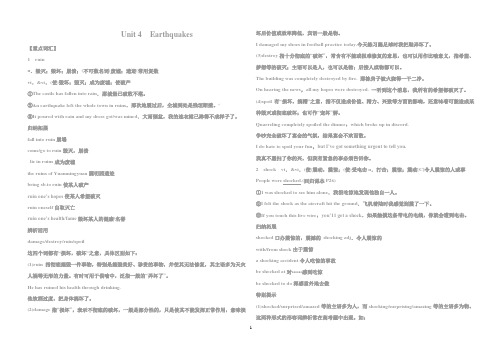
Unit 4 Earthquakes【重点词汇】1 ruinn.毁灭;毁坏;崩溃;(不可数名词)废墟;遗迹(常用复数vt.&vi.(使)毁坏;毁灭;成为废墟;使破产①The castle has fallen into rain.那城堡已破败不堪。
②An earthquake left the whole town in ruins.那次地震过后,全城到处是残垣断壁。
…③It poured with rain and my dress got/was mined.大雨倾盆,我的连衣裙已淋得不成样子了。
归纳拓展fall into ruin崩塌come/go to ruin毁灭,崩溃lie in ruins成为废墟the ruins of Yuanmingyuan圆明园遗迹bring sb.to ruin使某人破产ruin one‟s hopes使某人希望破灭ruin oneself自取灭亡ruin one‟s health/fame毁坏某人的健康/名誉辨析活用damage/destroy/ruin/spoil这四个词都有“损坏,破坏”之意,具体区别如下:(1)ruin指彻底摧毁一件事物,特别是摧毁美好、珍贵的事物,并使其无法修复,其主语多为天灾人祸等无形的力量。
有时可用于借喻中,泛指一般的“弄坏了”。
He has ruined his health through drinking.他饮酒过度,把身体搞坏了。
(2)damage指“损坏”,表示不彻底的破坏,一般是部分性的,只是使其不能发挥正常作用,意味损坏后价值或效率降低,宾语一般是物。
I damaged my shoes in football practice today.今天练习踢足球时我把鞋弄坏了。
(3)destroy指十分彻底的“破坏”,常含有不能或很难修复的意思,也可以用作比喻意义,指希望、梦想等的破灭;主语可以是人,也可以是物;后接人或物都可以。
高中英语人教版必修一Unit4Earthquakes单元教案
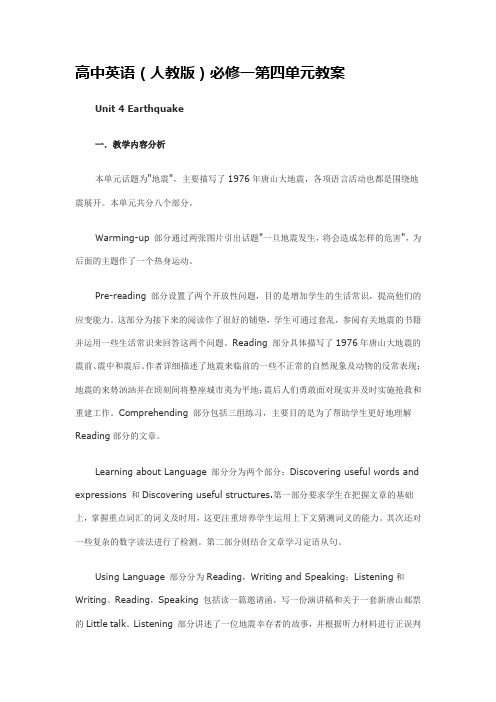
高中英语(人教版)必修一第四单元教案Unit 4 Earthquake一.教学内容分析本单元话题为"地震",主要描写了1976年唐山大地震,各项语言活动也都是围绕地震展开。
本单元共分八个部分。
Warming-up 部分通过两张图片引出话题"一旦地震发生,将会造成怎样的危害",为后面的主题作了一个热身运动。
Pre-reading 部分设置了两个开放性问题,目的是增加学生的生活常识,提高他们的应变能力。
这部分为接下来的阅读作了很好的铺垫,学生可通过套乱,参阅有关地震的书籍并运用一些生活常识来回答这两个问题。
Reading 部分具体描写了1976年唐山大地震的震前、震中和震后。
作者详细描述了地震来临前的一些不正常的自然现象及动物的反常表现;地震的来势汹汹并在顷刻间将整座城市夷为平地;震后人们勇敢面对现实并及时实施抢救和重建工作。
Comprehending 部分包括三组练习,主要目的是为了帮助学生更好地理解Reading部分的文章。
Learning about Language 部分分为两个部分:Discovering useful words and expressions 和Discovering useful structures.第一部分要求学生在把握文章的基础上,掌握重点词汇的词义及时用,这更注重培养学生运用上下文猜测词义的能力。
其次还对一些复杂的数字读法进行了检测。
第二部分则结合文章学习定语从句。
Using Language 部分分为Reading,Writing and Speaking;Listening和Writing。
Reading,Speaking 包括读一篇邀请函,写一份演讲稿和关于一套新唐山邮票的Little talk。
Listening 部分讲述了一位地震幸存者的故事,并根据听力材料进行正误判断和回答问题,旨在培养学生获取细节的能力,并通过听来模仿标准的语音和语调。
高考英语一轮复习话题4自然灾害(Unit4Earthquakes)新人教版必修1

话题4 自然灾害〔Unit 4 Earthquakes〕晨读背诵根底知识自测一、单词拓展(A)根据音标及词义写出英文单词。
1. event [ɪˈvent]n. 事件;大事2. dirt [dɜːt]n. 污垢;泥土→dirty [dɜːt ɪ]adj. 脏3. burst [bɜːst]vi. 爆裂;爆发;n. 突然破裂;爆发4. ruin [ˈruːɪn]n. 废墟;消灭;vt.〔使〕破产;消灭5. injure [ˈɪndʒə(r)]vt.& vi. 损害;伤害→injured [ˈɪndʒəd]adj. 受伤→injury [ˈɪndʒərɪ]n. 伤口6. useless [ˈjuːslɪs] adj. 无用;无效;无益7. destroy [dɪˈstrɔɪ]vt.破坏;毁坏→destruction [dɪˈstrʌkʃn]n. 破坏8. electricity [ɪˏlekˈtrɪsətɪ]n. 电;电流;电学→electric [ɪˈlektrɪk]adj. 用电;带电→electrical [ɪˈlektrɪkl]adj.与电有关9. rescue [ˈreskjuː]vt.& n. 援救;营救10. disaster [dɪˈzɑːstə(r)]n.灾难;灾祸11. shock [ʃɑk]vt.& vi. 〔使〕震惊;振动n. 休克;打击;震惊12. bury [ˈberɪ]vt. 埋葬;掩埋;隐藏13. mine [maɪn]n. 矿;矿山;矿井→miner [ˈmaɪnə(r)] n. 矿工14. frighten [ˈfraɪt(ə)n] vt. 使惊吓;吓唬→frightened [ˈfraɪt(ə)nd] adj. 受惊;受恫吓→frightening [ˈfraɪtnɪŋ] adj. 令人恐惧15. judge [dʒʌdʒ] n. 裁判员;法官vt. 判定;判断;判决16. sincerely [sɪnˈsɪəlɪ]adv. 真诚地;真挚地→sincere [sɪnˈsɪə]adj. 真诚;真挚(B)单词活用用所给词正确形式填空。
高中英语Unit4EarthquakesSectionⅠWarmingUpReading_Compr

Ⅰ Fast-reading Skim the text and choose the best answer. 1.What’s the main idea of the text? A.A terrible earthquake of Tangshan. B.Before the earthquake of Tangshan. C.During the earthquake of Tangshan. D.Damages of the earthquake of Tangshan. 答案:A
Unit 4 Earthquakes
The Chinese government was illprepared for a disaster of this scale at that time. The day following the quake, helicopters and planes began dropping food and medicine into the city. About 100,000 soldiers of the Chinese People’s Liberation Army were ordered to Tangshan, and many had to march on foot from Jinzhou, a distance of more than 180 miles. About 30,000 medical personnel were called in, along with 30,000 construction workers. In the decisive first week after the disaster, many people died from lack of medical care.
高中英语 Unit4 Earthquakes教案 新人教版必修1

高一英语教案新人教版必修1 Unit4 Earthquakes同步教材导学Unit 4Earthquakes(一)【单元导航】Moved by mother’s great love She had died when the rescuers found her.She was buried by the crushed house.Through gaps of those ruins,we can see her last posture(姿态).Being on her knees,the upper part of the body was prostrate (趴着的) forward,with her hands on the ground to support her body.That was something like an ancient who was kowtowing. The rescuers confirmed her death by touching her through the gaps of ruins.They shouted at the ruins again and again,knocked the bricks using the crowbar(铁棍), but no response inside. Then the rescuing team went to next building,suddenly the leader ran back,calling “come here”.He came to the body,stretched his hands under the woman, feeling and touching,then shouted loudly “there is someone,a baby,still living” . Through some efforts,rescuers cleaned up the ruins carefully which blocked her.Under her body lay her baby,who was wrapped in a small red quilt with yellow flowers scattered in red.He was about 3 or 4 months’ old.Since well protected by mother’s body,he was totally safe.He was sleeping on both ears when the rescuer carried him out,and his lovely and peaceful face warmed everyone around him.The doctor along with the rescuing team unfastened the quilt to check if the baby was all right,and he found there was a mobile phone filled in the quilt.The doctor looked at the screen subliminally,a written message was already there: “My dear baby, if you could fc1 live,don’t forget how much I love you”.As a doctor,he experienced too much of parting forever;but at this moment,he wept.The mobile was passed, every person who saw this message shaded tears.Section One Warming Up and ReadingⅠ.Lead in 1.Who can remember what happened in Yushu,in Qinghai Province in the year 2010?A terrible earthquake broke out there on April 14th.More than 2,200 people were killed. 2.Do you know any other natural disasters?tornadoes;typhoons/hurricanes;volcano eruption;drought;floods;etc. 3.Can you tell some famous land earthquakes? (1)Pakistan Earthquake:On October 8th,2005,a terrible earthquake which measured 7.6 on the Richter scale happened in Pakistan,Afghanistan and India.And Pakistan was the most seriousaffected country,in which 38,000 people died,62,000 people injured and 25,000 people were homeless.(2)San Francisco:On October 17,1989,an earthquake measuring 7.1 on the Richter scale struck San Francisco.(3)The Wenchuan Earthquake in 2008. 4.Do you know why an earthquake happens? The plates are moving constantly.Sometimes these two plates stop and do not move for years.Then suddenly,they jump and an earthquake happens.As a result of the movement of these plates ,west America near the sea has always been a bad place for earthquakes. 5.What do you think may happen before an earthquake? Mice ran out of the fields looking for places to hide.Fish jumped out of bowls and ponds.The chickens and even pigs were too nervous to eat.The dog barked loudly again and again.People could see bright lights in the sky.(二).速读课文,回答下列问题速读课文1.What happened?2.Where did it happen?3.How long did it last?4.Who helped to rescue the trapped people?(三).精读课文,回答下列问题精读课文1.概括每一部分的大意Part 1(Para.1):Before the earthquake,strange things began to happen but no one took any notice of them.Part 2(Paras.2~3):The earthquake destroyed the city of Tangshan and shockedthe people very much.Part 3(Para.4):The army came to help the survivors,bringing hope for a new life.2.True or false?(1)People in Tangshan were warned of the earthquake and didn’t go to bed that night.(F)(2)People in Beijing also felt the earthquake.(T)(3)More than 400,000 people were killed in the earthquake.(F)(4)Many rescue workers and doctors were trapped under the ruins during the aftershock.(T)(5)People tried to get fresh water from under the ground in Tangshan.(F)3.完成下列空格Main idea northeast Hebei. The water in the wells ( 2 )rose and ( 3 )fell. Signs before the earthquake (Para.1) A ( 4 )smelly gas came out of the cracks. The chickens and even the pigs were too ( 5 )nervous to ( 6 )eat. Mice ( 7 )ran out of the fields looking for places to hide. Fish about ( 8 )jumped out of their bowls and ponds. At about ( 9 )3∶00 a.m. on July 28,1976,people saw ( 10 )bright lights in the sky. At ( 11 )3∶42 a.m.,the ( 12 )greatest earthquake of the 20th century began. ( 13 )Steam burst from holes in the ground. Damage caused by earthquake (Paras fc1 .2~3) Hard hills of rock became rivers of ( 14 )dirt. ( 15 )Bricks covered the ground like red autumn leaves. Two ( 16 )dams and most of the bridges fell. The railway tracks were now ( 17 )useless piecesof ( 18 )steel. ( 19 )Sand now filled the wells instead of water. Water,food,and ( 20 )electricity were hard to get.4.填入正确的数据(1)1/3 of the nation felt the earthquake. (2)A huge crack that was 8 kilometres long and 30 metres wide cut across houses, roads and canals. (3)In 15 terrible seconds a large city lay in ruins. (4)2/3 of the people died or were injured during the earthquake. Details (1)Strange things were happening in the countryside of (5)The number of people who were k illed or injured reached more than 400,000. (6)All of the city’s hospitals,75% of its factories and buildings and 90% of its homes were gone.5.与同桌讨论、理解下列长难句并尝试翻译成汉语与同桌讨论1.Mice ran out of the fields looking for places to hide. 句子结构分析:现在分词短语 looking for places to hide 在句中表伴随,作伴随状语。
高中英语必修一Unit4Earthquake同步练习含答案2
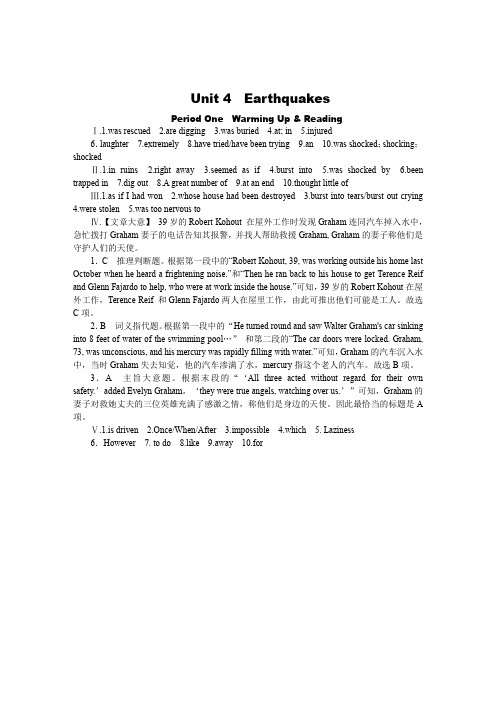
Unit 4EarthquakesPeriod One Warming Up & ReadingⅠ.1.was rescued 2.are digging 3.was buried 4.at; in 5.injured6.laughter7.extremely8.have tried/have been trying9.an10.was shocked;shocking;shockedⅡ.1.in ruins 2.right away 3.seemed as if 4.burst into 5.was shocked by 6.been trapped in7.dig out8.A great number of9.at an end10.thought little ofⅢ.1.as if I had won 2.whose house had been destroyed 3.burst into tears/burst out crying 4.were stolen 5.was too nervous toⅣ.【文章大意】39岁的Robert Kohout 在屋外工作时发现Graham连同汽车掉入水中,急忙拨打Graham妻子的电话告知其报警,并找人帮助救援Graham, Graham的妻子称他们是守护人们的天使。
1.C推理判断题。
根据第一段中的“Robert Kohout, 39, was working outside his home last October when he heard a frighte ning noise.”和“Then he ran back to his house to get Terence Reif and Glenn Fajardo to help, who were at work inside the house.”可知,39岁的Robert Kohout在屋外工作,Terence Reif 和Glenn Fajardo两人在屋里工作,由此可推出他们可能是工人。
高中英语 book 1Unit 4 Earthquakes
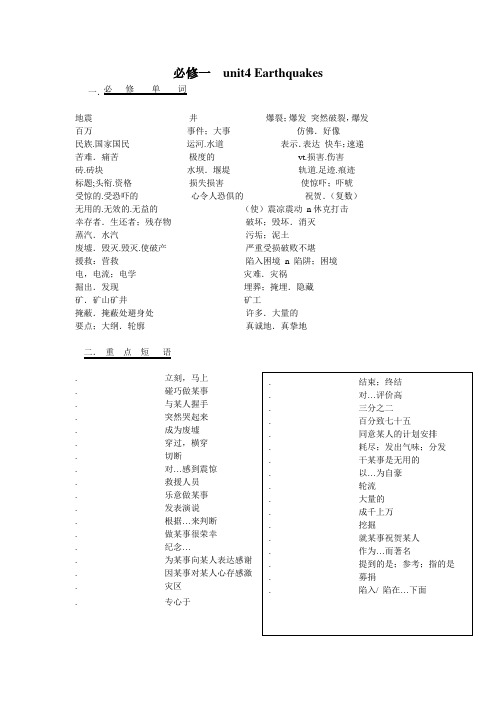
unit4 Earthquakes地震_____________ 井 _____________爆裂;爆发突然破裂,爆发____________ 百万_____________ 事件;大事_____________ 仿佛.好像_____________民族.国家国民_____________运河.水道_____________表示.表达快车;速递_____________ 苦难.痛苦_____________ 极度的_____________ vt.损害.伤害 _____________ 砖.砖块_____________ 水坝.堰堤 _____________轨道.足迹.痕迹_____________ 标题;头衔.资格_____________损失损害 _____________ 使惊吓;吓唬 _____________ 受惊的.受恐吓的____________心令人恐俱的_____________ 祝贺.(复数)_____________ 无用的.无效的.无益的_____________ (使)震凉震动n休克打击 ____________ 幸存者.生还者;残存物_____________ 破坏;毁坏.消灭_____________蒸汽.水汽_____________ 污垢;泥土 _____________废墟.毁灭.毁灭.使破产_____________ 严重受损破败不堪_____________援救:营救_____________ 陷入困境n 陷阱;困境_____________电,电流;电学_____________ 灾难.灾祸_____________掘出.发现 _____________ 埋葬;掩埋.隐藏 _____________矿.矿山矿井 _____________ 矿工_____________掩蔽.掩蔽处避身处_____________ 许多.大量的_____________要点;大纲.轮廓_____________ 真诚地.真挚地_____________二.重点短语.___________________ 立刻,马上.___________________ 碰巧做某事.___________________ 与某人握手.___________________ 突然哭起来.___________________ 成为废墟.___________________ 穿过,横穿.___________________ 切断.___________________ 对…感到震惊.___________________ 救援人员.___________________ 乐意做某事.___________________ 发表演说.___________________ 根据…来判断.___________________ 做某事很荣幸.___________________纪念….___________________ 为某事向某人表达感谢.___________________ 因某事对某人心存感激.___________________ 灾区.___________________ 专心于三.重点句子1. 河北省东北部的农村不断有些怪事发生。
高考英语总复习 Unit 4 Earthquakes教学案 新人教版必修1-新人教版高三必修1英语教
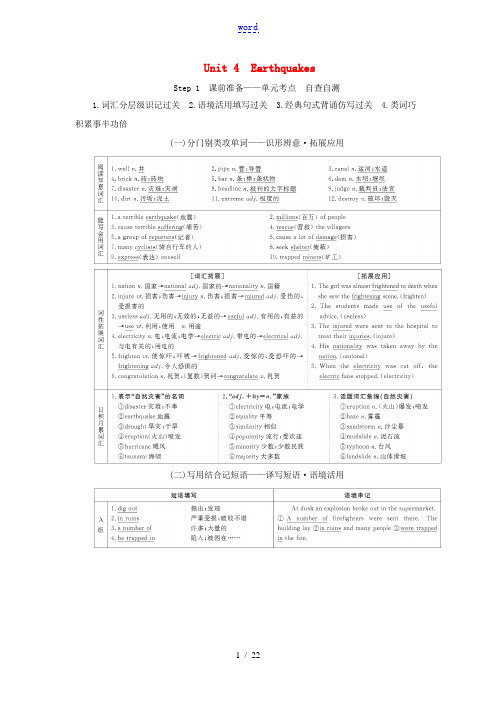
Unit 4 EarthquakesStep 1 课前准备——单元考点自查自测1.词汇分层级识记过关2.语境活用填写过关3.经典句式背诵仿写过关4.类词巧积累事半功倍(一)分门别类攻单词——识形辨意·拓展应用(二)写用结合记短语——译写短语·语境活用(三)仿写活用练句式——经典句型·仿写背诵Step 2 课堂探究——核心考点点点突破1.重点难点考点学通练透2.归纳总结拓展开阔视野3.方法规律技巧权威点拨4.面面俱到打创高效课堂第一时段Warming up & Reading1.burst vi.爆裂;爆发;突然迸发;冲;闯n.突然破裂;爆发[教材原句] In the city, the water pipes in some buildings cracked and burst.在市内,有些建筑物里的水管出现裂缝并爆裂开来。
(1)burst in/into 闯入;突然破门而入(2) ⎭⎪⎬⎪⎫burst out crying/laughing burst into tears/laughter 突然哭起来/笑起来 burst with anger 勃然大怒单句语法填空①On hearing the news, Mary burst ________ laughter while Lucy burst out ________(cry).②Last night the room ____________(burst) into but nothing was taken away.[答案] ①into; crying ②was burst2.ruin n .[U ]毁灭;毁坏;崩溃;[常用复数]废墟;遗迹 vt.(使)毁坏;成为废墟[教材原句] In fifteen terrible seconds a large city lay in ruins .在可怕的15 秒内,一座大城市成了废墟。
《高中英语人教版课件:必修1Unit4Earthquakes》

地震成因
板块运动
板块碰撞或者板块内部突然释 放能量造成地震。
地下岩石结构变化
地球上的岩石一直在运动,这 些运动可以在断层或岩石结构 变化时引发地震。
人造地震
人类活动如水库建设、探矿等 都可能引起地震。
里氏震级
定义
里氏震级是衡量地震能量大 小的对数表示法。
地震响应管理是减轻地震后果的 关键。科学家专注于如何使响应 管理变得更快、更有效。
技术创新
科学技术在地震研究和应对中扮 演重要角色。近年来,新技术如 地震预警,已经得到了越来越多 的关注。
支援地震灾区的组织
1 联合国
联合国协调救灾工作,处理人道主义 援助。
2 红十字会
提供紧急援助,如救助受伤、提供药 物和安置流离失所者。
计算方法
通过地震波到达时间的差异 和距离,算出震源的位置和 球面扩展速度,然后根据震 源释放的能量计算出震级。
震级影响
每增加一级,地震的能量会 增强大约32倍。一场级别6的 地震能破坏大部分城市建筑, 造成大量人员伤亡。
、云彩和地下水位的变化
现代监测方法
2
等自然现象来判断地震是否即将发生。
3 救援队
派出救援队到地震现场,疏散被地震困住的人员。
开展地震监测,以期尽早 发现地震的迹象;建造防 护墙和机器人等通过遥远 的地洞来探索隐蔽的岩石 形态,以计算潜在的海啸。
应对地震:防灾减灾知识
家庭应急预案
事先制定详细的家庭应急预案, 包括紧急联系人的信息、密钥 存放的位置、粮食饮用水的储 备、急救工具等。
安全撤离
在地震中,要远离易破碎物品 和大树,如果室内,则躲在结 构牢固的墙壁下或桌子下。
高中英语必修知识1《Unit 4 Earthquakes》教案人教版

高中英语必修知识1《Unit 4 Earthquakes》教案人教版高中英语必修知识1《Unit 4 Earthquakes》教案人教版部分学生在复习时缺乏系统安排和科学计划,或者学习和复习没有个性化特点,导致学习效果不明显。
下面和课件网一起看看有关高中英语必修知识1《Unit 4 Earthquakes》教案人教版。
《Unit 4 Earthquakes》教案1教学准备教学目标掌握住列举的重点单词和句子教学重难点掌握住列举的重点单词和句子并能灵活运用教学过程Ⅰ.重点单词1.________ vi. 爆裂;爆发n. 突然破裂;爆发2.________ n. 事件;大事3.________ n. 废墟;毁灭vt. 毁灭;使破产4.________ adj. 极度的5.________ vt. 破坏;毁坏;消灭6.________ vt. vi. (使)震惊;震动n. 休克;打击;震惊7.________ n. vt. 援救;营救8.________ vt. 使陷入困境n. 陷阱;困境9.________ n. 灾难;灾祸10.________ vt. 埋葬;掩埋;隐藏11.________ n. vt. 损失;损害12.________ n. 裁判员;法官vt. 断定;判断;判决13.________ vt. 损害;伤害 rarr;________ n. 伤害;损害 rarr;________ adj. 受伤的14.________ n. 电;电流;电学 rarr;________ adj. 用电的;带电的 rarr;________ adj. 与电有关的;电学的15.________ vt. 使惊吓;吓唬rarr; ________ adj. 受惊的;受恐吓的rarr; ________ adj. 令人恐惧的16.____________ n. 祝贺;(复数)贺词rarr; _____________ vt. 祝贺Ⅱ.重点短语1.a (great) number ________ 许多;大量的2.dig ________ 掘出;发现3.________ an end 结束;终结4.right ________ 立刻;马上5.as ________ 仿佛;好像6.________ ruins 严重受损;破败不堪7.think little ________ 轻视,满不在乎8.tens ________ thousands of 数以万计9.be proud ________ 以……自豪10.judge ________ 从……判断11.be trapped ________ 陷入12.be buried ________ 埋头于13.put ________ shelters 搭建避难所14.get away ________ 离开15.pay attention ________ 注意Ⅲ知识点教案EX.2 On seeing Jay Chow appear on the stage, the audience burst out _________ (cheer).burst with anger/ joy勃然大怒burst n.突然破裂;爆发a burst of laughter一阵笑声2.n. 废墟,遗迹(常用复数形式);毁灭be/lie in ruins成为废墟;严重受损;破败不堪EX.1 All the towns were/lay in _____ (ruin)after the earthquake.vt.毁灭;使破产ruin oneselfruin one’s health/fame/futureEX.2 过量吸烟损害健康,因此你应该戒烟。
- 1、下载文档前请自行甄别文档内容的完整性,平台不提供额外的编辑、内容补充、找答案等附加服务。
- 2、"仅部分预览"的文档,不可在线预览部分如存在完整性等问题,可反馈申请退款(可完整预览的文档不适用该条件!)。
- 3、如文档侵犯您的权益,请联系客服反馈,我们会尽快为您处理(人工客服工作时间:9:00-18:30)。
Period One Warming Up & Reading (Ⅱ)基础落实Ⅰ.单词检测1.v.________爆裂;________毁灭;________损害;伤害;________毁坏;破坏;________(使)震惊;________营救;________使陷入困境;________埋葬2.n.________地震; ________井;________管;导管;________百万;________大事;________民族;国家;________运河;________蒸汽;________污垢;________苦难;________砖;________水坝;________足迹;________电;________灾难;________矿山;________掩蔽;________标题;________记者3.adj.________发臭的;________极度的;________无用的Ⅱ.短语检测1.________________立刻;马上2.________________仿佛;好像3.________________结束;终结4.________________严重受损;破败不堪5.________________掘出;发现6.________________许多;大量的Ⅲ.选词填空错误!1.We are expecting to ________________ some important facts.2.Some robbers ________________ that house,and robbed many things of it. 3.On hearing the good news,he shared it with his parents ________________. 4.The powerful earthquake left almost everything in the town ________________. 5.The girl listened carefully ________________ she had been turned into a stone. 6.I ________________ the heavy rain on the way to school yesterday.7.When we arrived at the cinema in a hurry,the film was almost ________________. 8._____________________ fans came to the street to celebrate the victory of the Spanish team.Ⅳ.句型转换1.The end of my holiday came and I had to go back to work.My holiday was ________ ________ ________ and I had to go back to work. 2.Of the two boys,one is good at painting.________ ________ ________ the two boys are good at painting.3.He is not old enough to work for his bread.He is ________ ________ ________ ________ for his bread.4.Everywhere he goes,he will not forget the terrible experience.________ ________ ________ he goes,he will not forget the terrible experience. 5.It was a city whose hospitals were gone.It was a city ________ ________ the hospitals were gone.Ⅴ.单项填空1.It______ everyone to hear all of the villagers behind the mountain were killed in the earthquake.A.suffered B.shockedC.persuaded D.destroyed2.According to a new survey,every year about ________ dollars is spent to look after people with illness caused by smoking.A.30 millions of B.30 million ofC.30 millions D.30 million3.After the terrible traffic accident happened,many doctors and nurses were called to ________ the passengers.A.rescue B.valueC.support D.welcome4.—We need an immediate reply.—I see.I’ll send the paper to you ________.A.just now B.sooner or laterC.right away D.for a while5.The bus driver was badly ________ on both legs in the traffic accident.A.wounded B.harmedC.injured D.destroyed6.He was so ________ thought that he didn’t see the pole on the road.A.buried in B.careful withC.busy with D.serious about7.—He seems________ tired to do it.—But I am only________ glad to do it.A.very;too B.extremely;tooC.too;too D.very;very8.This is really a heated debate.________ the game?A.Which side do you think will winB.Whom do you think will winC.Do you think which side will winD.Do you think whom will win9.Threefourths of the homework ________.A.has finished B.has been finishedC.have finished D.have been finished10.As soon as she saw her boyfriend,she ________ crying.A.burst into B.broke outC.burst out D.broke in11.The houses across the street are ________,but they were in good condition a few years ago.A.in rows B.in ruinsC.in number D.in detail12.How many English songs had you learned ________ of last year?A.at the end B.in the endC.by the end D.at an end13.The young man was buried under the ruins and had to_________.A.be dug in B.be dug outC.dig out D.dig in14.________ out for food.Some work in the tunnels as guards and workers.A.Not all the ants go B.All the ants not goC.Both the ants don’t go D.All the ants go15.Have you ever noticed the house, ________ windows are always closed?A.where B.whichC.when D.whose能力提升阅读理解It is difficult for parents of nearly every family to teach their children to be responsible for housework,but with one of the following suggestions,you really can get your children to help at home.If you give your children the impression that they can never do anything quite right,then they will regard themselves as unfit or unable persons.Unless children believe they can succeed,they will never become totally independent.My daughter Carla’s fifthgrade teacher mad e every child in her class feel special.When students received less than a prefect test score,she would point out what they had mastered and declared firmly they could learn what they had missed.You can use the same technique when you evaluate our child’s work at home.Don’t always scold and give lots of praise instead.Talk about what he has done right,not about what he hasn’t done.If your child completes a difficult task,promise him a Sunday trip or a ball game with Dad.Learning is a process of trying and failing and trying and succeeding.If you teach your children not to fear a mistake or failure,they will learn faster and achieve success at last.1.The whole passage deals with ________.A.social education B.school educationC.family education D.p reschool education2.The author thinks that ________.A.there is no way to get children to help at homeB.the more encouragement and praise you give,the more responsible and helpful children will becomeC.it is very difficult to make children responsible for houseworkD.children can be forced to help with housework3.The passage gives us a good suggestion about how to evaluate your child’s work at home.That is to ________.A.praise his successB.promise him a tripC.give him a punishmentD.promise him a ball game4.The author advises readers to ________.A.learn from himself,for he has a good way of teachingB.take pride in Carla’s fifthgrade teacherC.do as what Carla’s teacher did in educating childrenD.follow Carla’s example because she never fails in the test答案基础落实Ⅰ.1.burst;ruin;injure;destroy;shock;rescue;trap;bury 2.earthquake/quake;well;pipe;million;event;nation;canal;steam;dirt;suffering;brick;dam;track;electricity;disaster;mine;shelter;title;reporter 3.smelly;extreme;uselessⅡ.1.right away 2.as if 3.at an end 4.in ruins 5.dig out 6.a (great) number ofⅢ.1.dig out 2.burst into 3.right away 4.in ruins 5.as if 6.was trapped in7.at an end 8.A great number ofⅣ.1.at;an;end 2.Not;both;of 3.too;young;to;work 4.No;matter;where5.of;whichⅤ.1.B 2.D 3.A 4.C 5.C 6.A 7.C 8.A 9.B 10.C 11.B 12.C 13.B 14.A 15.D能力提升1.C 2.B 3.A 4.C。
